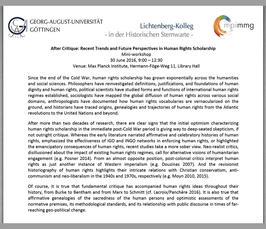"After Critique: Recent Trends and Future Perspectives in Human Rights Scholarship"
Workshops, conferences 2016
- Date: Jun 30, 2016
- Location: MPI-MMG, Hermann-Föge-Weg 11, Göttingen
- Room: Library Hall

For more details please contact esser(at)mmg.mpg.de.
Since the end of the Cold War, human rights scholarship has grown
exponentially across the humanities and social sciences. Philosophers
have reinvestigated definitions, justifications, and foundations of
human dignity and human rights, political scientists have studied forms
and functions of international human rights regimes established,
sociologists have mapped the global diffusion of human rights across
various social domains, anthropologists have documented how human rights
vocabularies are vernacularized on the ground, and historians have
traced origins, genealogies and trajectories of human rights from the
Atlantic revolutions to the United Nations and beyond.
After more than two decades of research, there are clear signs that the initial optimism characterizing human rights scholarship in the immediate post-Cold War period is giving way to deep-seated skepticism, if not outright critique. Whereas the early literature narrated affirmative and celebratory histories of human rights, emphasized the effectiveness of IGO and INGO networks in enforcing human rights, or highlighted the emancipatory consequences of human rights, recent studies take a more sober view. Neo-realist critics, disillusioned about the impact of existing human rights regimes, call for alternative visions of humanitarian engagement (e.g. Posner 2014). From an almost opposite position, post-colonial critics interpret human rights as just another instance of Western imperialism (e.g. Douzinas 2007). And the revisionist historiography of human rights highlights their intricate relations with Christian conservatism, anti-communism and neo-liberalism in the 1940s and 1970s, respectively (e.g. Moyn 2010, 2015).
Of course, it is true that fundamental critique has accompanied human rights ideas throughout their history, from Burke to Bentham and from Marx to Schmitt (cf. Lacroix/Panchère 2016). It is also true that affirmative genealogies of the sacredness of the human persons and optimistic assessments of the international human rights machinery continue to be written. However, the recent wave of critique necessitates thorough reflection about the future direction of human rights scholarship, its implicit normative premises, its methodological standards, and its relationship with public discourse in times of farreaching geo-political change.
This mini-workshop is meant to engage in such reflection in rather informal manner. Panelists are asked to take stock of their respective disciplines and fields of research and to reflect upon future challenges and perspectives for human rights scholarship.
Panel 1 (9:15 – 10:45): Human rights in historical studies
- Martin van Gelderen (intellectual history), Lichtenberg Kolleg Göttingen
- Dieter Gosewinkel (history), wzb Berlin
- Christopher Roberts (legal history), University of Minnesota
Coffee break
Panel 2 (11:00 – 12:30): Human rights in the social sciences
- Anja Jetschke (international relations), University of Göttingen
- Zachary Elkins (political science), University of Texas at Austin
- Ran Hirschl (comparative constitutionalism), University of Toronto